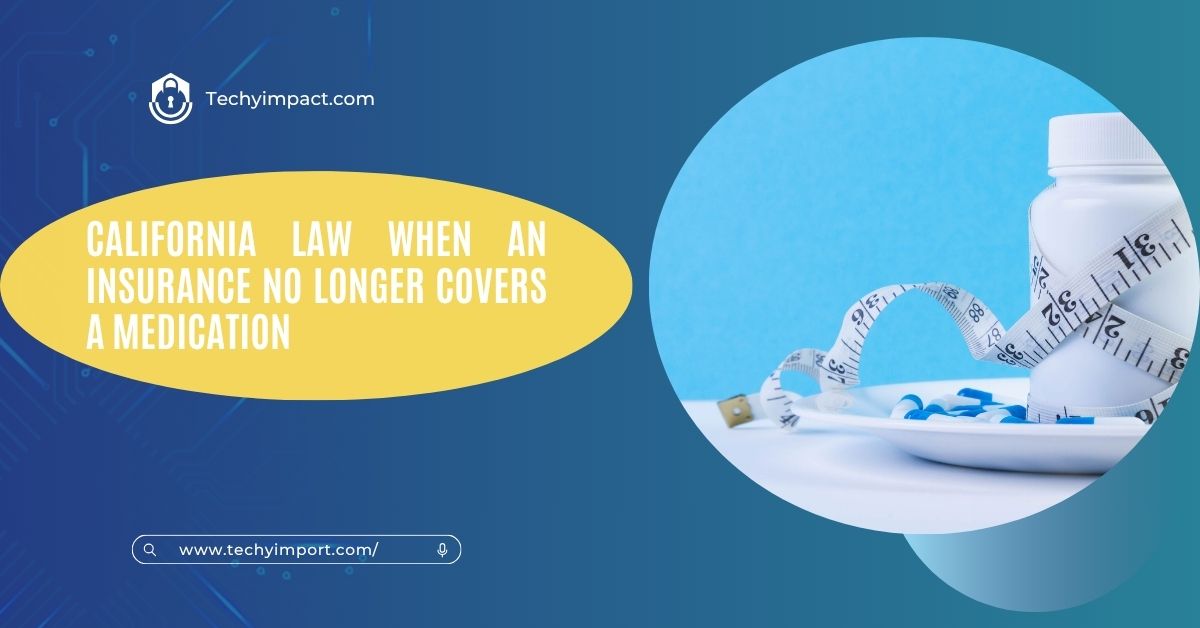I had an issue once when my insurance would not pay for my prescription drugs. Initially, I was concerned, but after consulting with my physician, I appealed. Additionally, I became aware of the external review procedure that aided in the approval of my drug.
How to deal with prescription drug insurance denials is covered in this article. You can file an appeal and request an outside review if your insurance company declines to pay for your medication. The procedure might be aided by your physician.
In this article, you will learn simple ways to get your insurance to cover your medicine.
Table of Contents
- What should I do if my insurance stops covering my drug?
- How to Appeal a Coverage Denial – Protect Your Rights!
- How does California law cover cases – Get Legal Help Now!
- How Can I sue my insurer – Sue Your Insurer!
- Can my croaker help me get content?
- What’s an external review?
- How to insure drug content for habitual conditions?
- Why do insurance companies deny specifics?
- What are the consequences for illegal denial?
- What are my legal rights if my insurance unfairly refuses content?
- Are there laws taking content for certain specifics?
- FAQs:
- Conclusion:
What should I do if my insurance stops covering my drug?
Still, the first step is to understand why, if your insurance company suddenly stops covering your drug. communicate your insurance provider and request a detailed explanation for the denial or termination of content.
However, you have the right to file an appeal, If the original denial stands. Follow your insurance’s specific appeal process, furnishing all necessary medical evidence.However, you can request an external review by an independent third party, If your appeal is denied.
How to Appeal a Coverage Denial – Protect Your Rights!
The appeal process is a step- by- step system that allows you to challenge an insurance company’s decision to deny content for a drug. In California, you generally start by requesting a written explanation from your insurer about why your drug was denied.
Once you admit this, your healthcare provider can submit fresh medical records, letters, or substantiation to support your need for the drug. You generally have a limited quantum of time, frequently 180 days to file an appeal, so acting instantly is essential.
How does California law cover cases – Get Legal Help Now!

California law provides strong protections for cases facing issues with insurance content. These laws are designed to ensure that insurance companies treat cases fairly and do n’t unfairly deny necessary treatments or specifics.The ability to appeal any content restriction is a vital safeguard.
Insurance companies are needed to give you a clear explanation of why they denied your drug and give a process to challenge their decision. Also, California law allows you to request an external review if your appeal is denied, giving an independent third party the authority to overturn illegal opinions.
How Can I sue my insurer – Sue Your Insurer!
- Legal Option: You have the right to take legal action against your insurer if they act unfairly.Suing is a way to protect yourself when other methods haven’t worked.
- Claim Denial: If your insurance company refuses to pay a valid claim, you can consider suing.They might deny your claim without a good reason, which is unfair.
- Get Compensation: Suing can help you receive the money you need for medical bills or damages.It’s a way to recover financially if your insurer doesn’t pay as they should.
- Unfair Denials:Sometimes, insurance companies deny claims without proper cause.This can be frustrating and unfair to the person who needs help.You can take legal steps to challenge these unfair denials.
- Delayed Payment:If your insurer delays paying you for a long time, you can sue.Waiting too long can cause financial problems for you.Legal action can push them to pay faster.
- Wrongful Actions:Insurance companies might make mistakes or act wrongly.If they deny your claim by mistake, you can fight back in court. This helps ensure they follow the rules.
- Legal Steps: When you believe your insurer is unfair or breaking laws, legal action is an option.You can file a lawsuit to seek justice.It’s a way to hold them accountable.
Can my croaker help me get content?
Absolutely. Your croaker plays a pivotal part when your insurance denies content for a drug. Medical professionals are frequently stylish lawyers because they understand the significance of the drug for your health.
However, your croaker can submit a previous authorization request, furnishing detailed medical reasons why you need the drug, If your insurer refuses to cover your drug. They can also submit supporting attestation, similar as medical records and a letter of medical necessity, to strengthen your case.
What’s an external review?
An external review is an important process that provides an independent opinion about whether an insurance denial is justified. When your insurance company refuses to cover a drug after your appeal, you have the right under California law to request an external review.
This review is conducted by an independent third- party association that specializes in assessing insurance opinions. The process generally involves submitting a formal request along with all applicable medical attestation and appeal opinions.
How to insure drug content for habitual conditions?

Still, securing nonstop drug content is vital, If you have a habitual or ongoing health condition. To do this, start by completely understanding your insurance plan’s formulary, which lists the covered specifics.
Regularly review this list, especially if your plan undergoes updates, so you’re apprehensive of any changes. Work nearly with your healthcare provider to explore volition specifics that are covered but still effective for your condition.
Why do insurance companies deny specifics?
Insurance companies may deny drug content for colorful reasons, but some are more common than others. One frequent reason is that the drug is n’t included in the insurer’s formulary, meaning it’s not part of the list of covered medicines.
Another common reason is that the insurer believes the drug is n’t medically necessary or that a less precious treatment could be inversely effective, which leads to denial grounded on medical necessity criteria. Step remedy conditions.
What are the consequences for illegal denial?
Illegal Denial Is Against the Law:
When insurance companies refuse to pay unfairly, they are breaking the law. This can lead to legal actions against them. Consumers have rights that protect them from such unfair practices.
Refusal to Cover Necessary Treatments:
They might not pay for medicines or treatments you really need. This can leave you without the care you deserve.Denials of essential care can worsen health outcomes.It’s important to know your rights to get the coverage you need.
Delays in Getting Care:
Illegal denial can cause you to wait longer for proper health care.Delays can make health problems worse.Timely treatment is crucial for better health results.Appealing denied claims can help speed up your access to care.
Paying More Out of Pocket:
You may have to spend your own money for treatment if your claim is denied.This can create financial stress.Unexpected expenses can be hard to manage.Understanding your rights can help reduce these costs.
Risk to Your Health:
Not getting the right treatment can make your health worse.It can lead to serious health issues. Delays or denials can cause long-term health problems.Seeking help quickly can prevent further damage.
What are my legal rights if my insurance unfairly refuses content?
You have legal rights under California law if your insurance company unfairly refuses to cover your drug. These rights include the right to appeal insurance opinions, request external reviews, and train complaints with state agencies like the California Department of Insurance( CDI).
Insurance companies are needed to give clear reasons for denial and follow fair procedures.However, you can challenge it through the prayers process and request an independent review, If you believe the denial is unjustified or discriminative.
Are there laws taking content for certain specifics?

Yes, California has specific laws that bear insurance companies to cover certain specifics, especially for life hanging , habitual, or serious health conditions. For case, laws live to insure content for essential specifics, similar as those demanded for HIV/ AIDS, cancer, or internal health conditions.
hese laws aim to help insurance companies from unfairly denying content for medicines that are critical to case well- being. also, California authorizations that insurance plans must give content for tradition medicines without demarcation grounded on age, gender, or health status.
FAQs:
How long do I’ve to appeal?
The time limit for filing an appeal or an external review varies depending on your insurance plan and the specific circumstances, but generally, you have up to 180 days from the date of the denial to initiate an appeal. This window is set by law in California to insure cases act instantly to challenge content opinions.
Can I get legal help for illegal denials?
Yes, if your insurance company denies content unfairly, you can seek backing from colorful coffers. The California Department of Insurance( CDI) offers consumer backing programs that help policyholders understand their rights and navigate controversies.
How can I help losing drug content?
Prevention is always better than dealing with denials after the fact. To avoid losing content for your specifics, start by completely reviewing your insurance plan’s formulary and understanding its content rules. Regularly check for updates or changes to your plan, especially during open registration ages.
What if my drug is labeled “ experimental ”?
It means your insurance company considers it unproven or not extensively accepted as standard treatment, If your drug is labeled as experimental or investigational. still, numerous cases need these specifics for serious or rare conditions.
How long does resolving a disagreement take?
The timeline for resolving a drug content disagreement varies. Generally, insurance companies respond to prayers within 30 to 60 days.However, it can take a fresh 4 to 6 weeks for the independent critic to finalize their decision, If you request an external review.
Conclusion:
If your insurance provider acts unfairly or denies a legitimate claim, you have the right to sue them. It’s crucial to try communicating or making an appeal to solve the issue first. If that fails, you may be able to obtain the money you are entitled to by taking legal action.





